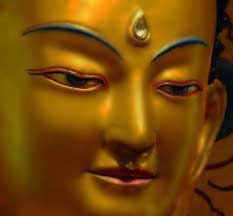Difference between revisions of "Rangtong"
(Redirected page to Shentong and Rangtong) |
|||
| (8 intermediate revisions by 2 users not shown) | |||
| Line 1: | Line 1: | ||
| − | + | [[File:100dfgh.jpg|thumb|250px|]] | |
| + | '''[[Rangtong]]''' ([[Wyl.]] ''[[rang stong]]'') literally means '[[empty of self]]' - The followers of the [[Rangtong]] [[Madhyamika]] approach say that all [[phenomena]], [[including]] the [[Buddha nature]], are [[empty]] of their [[own]] [[essence]]. | ||
| + | |||
| + | They therefore disagree with the [[Shentong]] approach, which, they say, falls into the extreme of [[eternalism]]. | ||
| + | |||
| + | [['phags seng gi lugs]] - expounding [[Rangtong]] according to the [[mngon rtogs rgyan]] of [[Maitreya]] | ||
| + | |||
| + | [[Intrinsic emptiness]] ([[rang stong]]) - [[emptiness of itself]]. | ||
| + | |||
| + | [[all things of samsara are empty]] of their [[own]] [[inherent essence]]). | ||
| + | |||
| + | the [[Rangtong]] system of [[philosophy]]. [[self-emptiness]], [[intrinsic emptiness]]. "[[self empty]]" school; [[unqualified emptiness]]/ [[self-emptiness]]. | ||
| + | |||
| + | |||
| + | The [[self-empty]] and other-empty terms arose only with the [[Sarma|new translations schools]] [[in Tibet]], and are therefore not part of [[traditional]] [[Nyingma]] vocabulary. Yet this does not mean that [[Nyingma scholars]] have not been engaged in [[debates]] surrounding these issues. There are no straightforward equivalents known in [[Sanskrit]] sources, yet [[scholars]] suspect that many aspects of this [[debate]] arose with [[scholars]] as [[Ratnakarashanti]]. | ||
| + | |||
| + | As for the [[Nyingmapas]], [[Mipham Rinpoche]] explains in the first [[chapter]] of the [[Beacon of Certainty]] that the [[Nyingma]] view falls neither in the extreme of [[self-emptiness]] nor [[other-emptiness]]. If pressed, [[Mipham]] continous, the view should be explained according to a [[nonimplicative negation]]. | ||
| + | |||
| + | [[rang stong]] - [[Rangtong]]. | ||
| + | |||
| + | An aspect of the [[Madhyamaka]] school in [[Tibet]] focusing on [[emptiness]] devoid of [[inherent]] [[existence]]. | ||
| + | |||
| + | Compare with [[Shentong]] | ||
| + | |||
| + | |||
| + | ==[[Criticism]]== | ||
| + | |||
| + | |||
| + | From the [[Shentong]] {{Wiki|perspective}}, the [[Rangtong]] [[view]] falls into the extreme of [[nihilism]]. | ||
| + | |||
| + | The [[Shentongpas]] say that underlying everything there must be the uncompounded [[luminosity]] of the [[buddha nature]], as the basis for [[samsara]] and [[nirvana]] and all the qualities of [[enlightenment]]. | ||
| + | |||
| + | [['phags seng gi lugs]] - expounding [[Rangtong]] according to the [[mngon rtogs rgyan]] of [[Maitreya]] [RY] | ||
| + | |||
| + | |||
| + | Compare with [[Shentong]] | ||
| + | |||
| + | see also: [[Shentong and Rangtong]] | ||
| + | |||
| + | {{RigpaWiki}} | ||
| + | [[Category:Rangtong]] | ||
Latest revision as of 21:58, 11 February 2020
Rangtong (Wyl. rang stong) literally means 'empty of self' - The followers of the Rangtong Madhyamika approach say that all phenomena, including the Buddha nature, are empty of their own essence.
They therefore disagree with the Shentong approach, which, they say, falls into the extreme of eternalism.
'phags seng gi lugs - expounding Rangtong according to the mngon rtogs rgyan of Maitreya
Intrinsic emptiness (rang stong) - emptiness of itself.
all things of samsara are empty of their own inherent essence).
the Rangtong system of philosophy. self-emptiness, intrinsic emptiness. "self empty" school; unqualified emptiness/ self-emptiness.
The self-empty and other-empty terms arose only with the new translations schools in Tibet, and are therefore not part of traditional Nyingma vocabulary. Yet this does not mean that Nyingma scholars have not been engaged in debates surrounding these issues. There are no straightforward equivalents known in Sanskrit sources, yet scholars suspect that many aspects of this debate arose with scholars as Ratnakarashanti.
As for the Nyingmapas, Mipham Rinpoche explains in the first chapter of the Beacon of Certainty that the Nyingma view falls neither in the extreme of self-emptiness nor other-emptiness. If pressed, Mipham continous, the view should be explained according to a nonimplicative negation.
An aspect of the Madhyamaka school in Tibet focusing on emptiness devoid of inherent existence.
Compare with Shentong
Criticism
From the Shentong perspective, the Rangtong view falls into the extreme of nihilism.
The Shentongpas say that underlying everything there must be the uncompounded luminosity of the buddha nature, as the basis for samsara and nirvana and all the qualities of enlightenment.
'phags seng gi lugs - expounding Rangtong according to the mngon rtogs rgyan of Maitreya [RY]
Compare with Shentong
see also: Shentong and Rangtong
